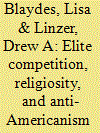| Srl | Item |
| 1 |
ID:
113551


|
|
|
|
|
| Publication |
2012.
|
| Summary/Abstract |
The battle for public opinion in the Islamic world is an ongoing priority for U.S. diplomacy. The current debate over why many Muslims hold anti-American views revolves around whether they dislike fundamental aspects of American culture and government, or what Americans do in international affairs. We argue, instead, that Muslim anti-Americanism is predominantly a domestic, elite-led phenomenon that intensifies when there is greater competition between Islamist and secular-nationalist political factions within a country. Although more observant Muslims tend to be more anti-American, paradoxically the most anti-American countries are those in which Muslim populations are less religious overall, and thus more divided on the religious-secular issue dimension. We provide case study evidence consistent with this explanation, as well as a multilevel statistical analysis of public opinion data from nearly 13,000 Muslim respondents in 21 countries.
|
|
|
|
|
|
|
|
|
|
|
|
|
|
|
|
| 2 |
ID:
131661


|
|
|
| 3 |
ID:
083781


|
|
|
|
|
| Publication |
2008.
|
| Summary/Abstract |
Why do some Muslim women adopt fundamentalist Islamic value systems that promote gender-based inequalities while others do not? This article considers the economic determinants of fundamentalist beliefs in the Muslim world, as women look to either marriage or employment to achieve financial security. Using cross-national public opinion data from eighteen countries with significant Muslim populations, the authors apply a latent class model to characterize respondents according to their views on gender norms, political Islam, and personal religiosity. Among women, lack of economic opportunity is a stronger predictor of fundamentalist belief systems than socioeconomic class. Cross-nationally, fundamentalism among women is most prevalent in poor countries and in those with a large male-female wage gap. These findings have important implications for the promotion of women's rights, the rise of political Islam, and the development of democracy in the Muslim world.
|
|
|
|
|
|
|
|
|
|
|
|
|
|
|
|